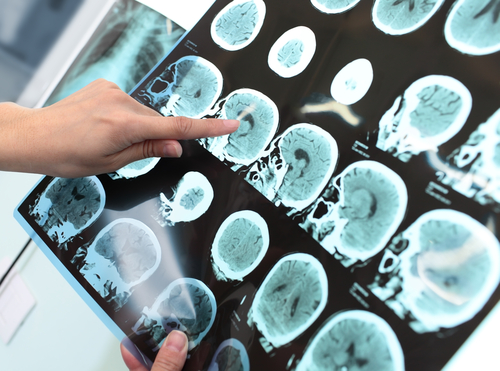Alzheimer’s Linked to Protein that Repairs DNA
Written by |

Alzheimer’s disease and cognitive deficits could be linked to reduced neuronal levels of BRCA1, a protein typically targeted in cancer research. These were the results of a study entitled “DNA repair factor BRCA1 depletion occurs in Alzheimer brains and impairs cognitive function in mice,” published in Nature Communications.
Neurodegenerative diseases like Alzheimer’s are characterized by neurons’ progressive loss of structure and function, ultimately leading to their death. Many factors have been suggested to contribute to nerve cell death, including membrane damage, mitochondrial dysfunction, and the accumulation of toxic proteins.
Defective DNA repair can also be a contributing factor, and this is where the protein comes into play. BRCA1 is a protein involved in DNA repair, notably during the process of cell division, and its impairment is known to cause the development of malignant cells, especially in breast and ovarian cancers. The function of BRCA1 in nerve cells is not yet established, but here researchers hypothesized that DNA repair in neurons contributes to facilitated learning and memory — and an imbalance between damage and repair may lead to neurodegeneration.
“BRCA1 has so far been studied primarily in dividing (multiplying) cells and in cancer, which is characterized by abnormal increases in cell numbers. We were therefore surprised to find that it also plays important roles in neurons, which don’t divide, and in a neurodegenerative disorder that is characterized by a loss of these brain cells,” first author Elsa Suberbielle, PhD, a research scientist at the Gladstone Institutes, said in a press release.
In this study, the researchers performed a series of experiments on a mice model in which they decreased the levels of the protein BRCA1 in neurons, observing that lower BRCA1 levels induced accumulation of DNA breakup/damage, neuronal shrinkage, impairments in neuronal communication, and memory/learning deficits.
Since some of these outcomes could be associated with Alzheimer’s, the scientists performed complementary experiments examining levels of neuronal BRCA1 in post-mortem brains of Alzheimer’s patients. The results showed the levels were lower by 65-75% when compared to controls, and the reduction was linked to amyloid-beta proteins accumulated in Alzheimer brains.
Overall, these findings highlight the association between Alzheimer’s disease and lower levels of BRCA1 caused by accumulation of amyloid-beta proteins. Currently, the researchers are investigating whether increasing the levels of BRCA1 in mice might restore DNA repair and so reverse the process of neurodegeneration.
Therapeutic manipulation of repair factors such as BRCA1 may ultimately be used to prevent neuronal damage and cognitive decline in patients with Alzheimer’s disease or in people at risk for the disease. “By normalizing the levels or function of BRCA1, it may be possible to protect neurons from excessive DNA damage and prevent the many detrimental processes it can set in motion,” said senior author Lennart Mucke, MD, director of the Gladstone Institute of Neurological Disease.





